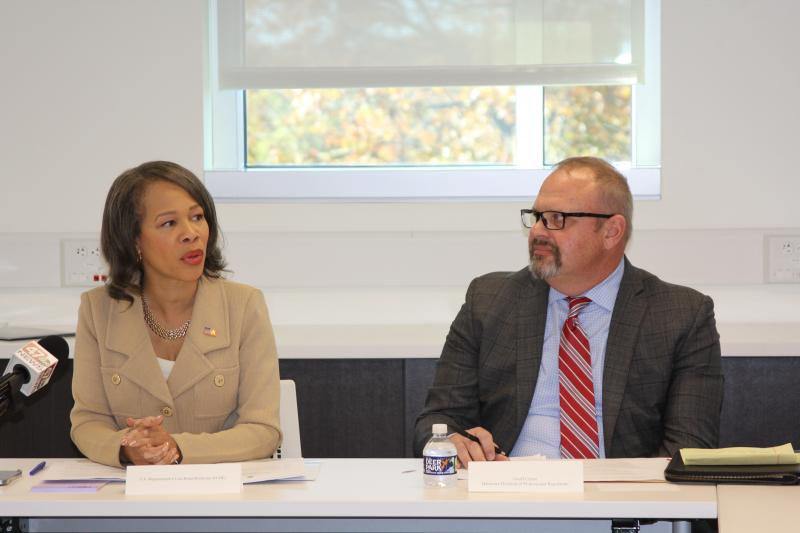Congresswoman explores nursing shortage
Nursing shortages and ways to remedy them were the top agenda items during a roundtable discussion held Oct. 27 at Beebe Healthcare in Lewes.
Congresswoman Lisa Blunt Rochester asked a group of local nursing experts about ways to alleviate an anticipated 1.1 million nursing shortage nationwide.
“This is a real concern. It’s a matter of our public health,” Blunt Rochester said.
Blunt Rochester made a big push for data collection through a National Nursing Workforce Center, part of legislation she introduced in September that would collect information on the wants and needs of the industry, she said.
Blunt Rochester described the center as a hub for education and nursing issues, which would help with recruiting and retaining nurses.
While Blunt Rochester said many nurses left the profession over burnout during the COVID-19 pandemic, Timothy Gibbs, executive director of the Delaware Academy of Medicine/Delaware Public Health Association, pointed to an aging workforce that will soon be retiring.
“I think we’re beginning to see the start of the silver tsunami,” he said, pointing to several bar graphs during a presentation, showing the anticipated decline of the nursing industry in the near future.
Burnout and low pay are at the root of the exodus, many nurses said.
“They are exhausted. That is a big piece of it,” said Stephanie McClellan, president of the Delaware Nurses Association, and manager of Bayhealth’s cancer institute. “Burnout is a real thing.”
Nishelle Harris-Hines, president of the Delaware Chapter of Black Nurses Rock, said many young nurses are leaving local low-paying healthcare jobs for more money elsewhere.
“So many people are leaving because they can travel and make $3,000 a week,” she said.
Traveling nurses can make $48 an hour and get an extra $2,000 a week in traveling expenses, Harris-Hines said.
Traveling nurses also are not weighed down with all the paperwork and menial tasks that full-time staff must contend with, she said.
None of the roundtable participants mentioned nurses and healthcare workers who were let go for refusing to get a COVID-19 vaccine as a reason for the shortage, and Dr. David Tam, president and CEO of Beebe Healthcare, said that was never an issue at Beebe.
Tam also said Beebe does not have a nursing shortage, and about 5% of the staff are traveling nurses. He said the nationwide nursing shortage is indicative of shortages felt across the healthcare industry. In Sussex County, there are physician shortages, and throughout the Cape Region’s coastal community, he said, pricey housing has made it difficult to staff housekeepers and other staff, leaving much of those duties to nurses.
“The nurse has been the center of healthcare,” he said.
Data collection through a nursing center will help target nursing needs regionally, he said. “Things vary from place to place,” Tam said. “New Castle County has different issues with housing, and can draw nurses from other states.”





















































